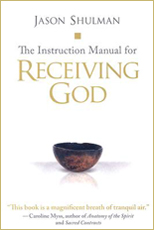"Life is a journey to see how big our hearts can get," writes Jason Shulman, the founder and director of A Society of Souls, a New Jersey-base school dedicated to awakening the human spirit. With more than three decades of study and practice in Zen Buddhism, he is also a Dharma lineage holder and one of the most highly respected exponents of Kabbalah today. Shulman addresses this book to people of all faiths: presenting an instruction manual with 108 "seed passages" — short meditative explorations of the relationship of human beings with God and each other.
While many seekers still think of life as a quest to find God, the author is convinced that God is not "lost or hiding." Right now, in this moment the Divine is manifesting. There is no need to become a better hunter:
"But God is not missing or elusive or invisible. It is we who need to make ourselves ready to receive God, who is always knocking at the door to our hearts, whose Voice is always speaking, whose Heart makes our hearts beat, and whose Breath is the world."
A term that appears again and again is awakening. It is the "birthright of every created being." It is a continuous process and not simply a realization. It is a place where we can hold all opposites together and nothing is discarded. It is a sensitivity toward mystery and the imperfections of human beings. It is faith that God is working things out through us and that difficulties can hold lessons that we need to learn. It is expressed through love of God and kindness to others.
What we like best about this book are Shulman's spiritual practices. Here are two:
• "Dear Reader: For the next week — or your entire lifetime, if you are sincere and brave — every time you drink a glass of water, consider it a moment of divinity, a moment when you dissolve into the All and remain exactly who you truly are. This is the true blessing of thirst as it brings us to a moment of awakening."
• "All day long, whenever you have a decision to make, say to yourself, What would I do if I were completely openhearted and in love with God? Then, do it."
All the religious traditions challenge us see the image of God within or to act in ways that mirror Divine creativity. Shulman does a fine job stimulating us to consider ourselves as divine beings. This process is sometimes called grace or sanctification or holiness or divinization. It deserves more attention and, in the excerpt we have chosen from the book, the author considers some central questions on the subject.
